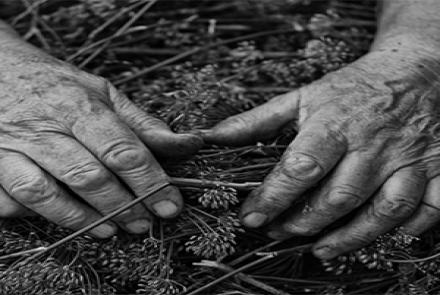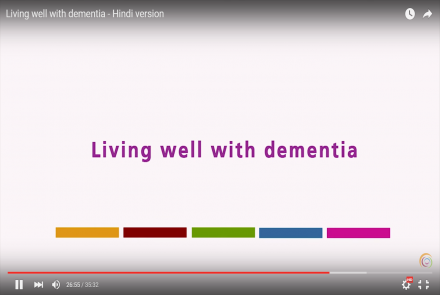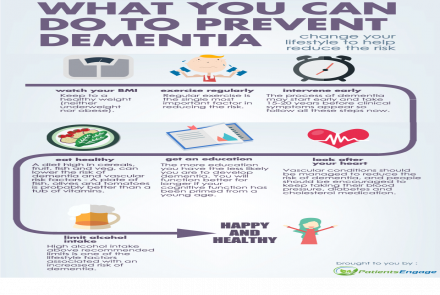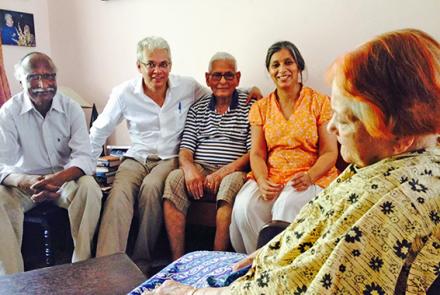
Neha Sinha, a clinical psychologist by training shares her views on caregiving in Dementia, the effects of longtime caregiving on a person, how to keep his balance in tact and also avoid an early burnout.
‘Caregiving often calls us to lean into love we didn’t know possible’ ~ Tia Walker
Caregiving in Dementia
Caring for people with dementia is in many ways more challenging than looking after somebody with a physical condition. This is because when you look after someone with dementia, you end up investing a piece of yourself.
Given the complex dynamics of the various symptoms of dementia – some even psychiatric in nature - it is also very difficult to convince oneself that dementia is not a ‘mental health issue’ but actually a neurological one. Why is this important? So that caregiver expectations can be managed and the caregiver understands that just like any physical illness, in this case also there is very little that the patient can do to manage his/her condition. This understanding is critical in beginning the long, exhaustive journey of becoming a caregiver for a dementia patient.
The Challenges
What makes the journey so difficult? Not only for children who are caring for their parent but even for professional caregivers, the consensus is that it is a tiring, challenging, time-consuming and, above all, an emotionally draining experience. This is something which requires immense patience and a whole lot of instinct. Instinct because sometimes even with the best professional advice, it is you as the caregiver who has the entire picture to reckon with and the understanding of what works and what does not.
When language abilities, of the person suffering from dementia, go away there are unpredictable mood swing, episodes of repetitive questioning or agitated behaviour, and this is when the caregiver needs a constant flow of energy. He needs to come up with new techniques to convince them for their daily shower, rationales to answer why they can’t ‘go home’ right now or simply motivate them to come out of their bedroom. Whatever it is, one thing is for sure that this role (for that matter any caregiving job) can’t be done mechanically. You really should want to help someone with dementia. Because one can’t be trained enough to deal with it, a lot of it needs to come from your own inherent qualities and inclinations as well. Which is why, it’s even more important to look after yourself if you are a primary caregiver.
Symptoms of caregiver burnout
One of the first things that one should learn about in this journey, is to identify the symptoms of caregiver burden. Although we have been hearing this term probably only in the last decade, but the practice of looking after and caring for a family member exists from centuries, especially in the Indian context. As more and more family structures change in modern India, the responsibility of looking after a senior member now often rests on a single person.
Caregiver burden or burnout refers to the distress that is experienced by the carer and it includes both objective (time, own health, etc) and subjective aspects of the process (own reactions, perceptions, hopelessness etc). This typically happens when someone takes more responsibility than they can manage or are unable to get help externally.
What are the signs of caregiver burnout?
- Loss of interest in personal activities
- Increase in anxiety
- Low mood, irritability or feeling of hopelessness
- Indifference
- ‘Taking it out’ on the patient even though one knows it’s not their fault
- Declining personal health or constantly falling ill
- Social isolation
- Poor family functioning
- Poor or irregular sleep patterns
- Lack of energy and fatigue
- Feeling victimised
What are some of the high risk factors for developing caregiver burnout? Why does it happen?
- No personal time and space to ‘recharge’ oneself
- Overlapping of roles:Difficulty in separating out one’s role and continuing to be a caregiver. For example: When a spouse has to play the dual role of being the caregiver as well as the spouse.
- Unrealistic expectations (from oneself): blaming self if there is a sudden decline, a new development in the illness or any other unpleasant change, instead of reminding oneself that this is part of the disease progression
- Lack of any external interest or hobbies
- Lack of physical exercise
- Poor social structure and support
- Dwindling finances: looking after dementia takes a toll on the financial condition especially because it may run into years.
Preventing caregiver burnout
What can we do to prevent it?
Like the age old belief goes, prevention is always better than intervention. Getting into therapeutic mode is tough and there may also be guilt and other dynamics at play to completely let go of one’s role. However, should the need come to that, one must absolutely seek professional help and deal with one’s own recuperation. After all, one cannot serve anything from an empty vessel.
Here are a few points to keep in mind to prevent this situation:
- Don’t feel guilty to think about yourself- you are far from being selfish
- Pamper yourself, give yourself that trip to the spa, ladies night out or just lazing around watching the match; because you do deserve it
- Ask for help: there is no shame in admitting that this is overwhelming or you broke down the other day, seeking professional help or simply finding a lending ear can do wonders in helping you feel better
- Normalise your feelings: Don’t beat yourself about feeling angry, depressed or even resentful that you are in this position. It is absolutely normal for anybody to feel this way and the first step for you is to be okay with it.
- Give time and the due attention to your spouse and children: if you feel fulfilled and well supported, you would be in a much better position to be a caregiver
- Remember to catch up with your friends, even if it is for a short while. If you can’t go out, invite them over
- Join a support group: reach out to more people in similar situations. Sometimes just knowing that there are several people on the same boat as you can be very comforting
- Educate yourself: a lot of times, unreasonable expectations can be a result of being ignorant. Understand the type of dementia it is, equip yourself about what to expect and not, especially about co-morbidities, behavioural symptoms, stages and management.
- Plan well: Most likely you are juggling several things at a time, be it your own family commitments, work or caregiving. A lot of your energy and anxiety can be taken care of by simply creating a detailed monthly or weekly planner.
- Don’t victimise yourself: remember that you can always do something about how you feel.
- Lastly, ask for honest advice and take those tough decisions: Does your loved one need a professional carer now? Does he or she need to be moved to a professional setting? What will they benefit from? You need to be practical, above all.
Positive Effects of Caregiving
Although much has been said about the negative effects of caregiving, there has been recent literature on the positive effects of caregiving as well. Feeling useful and wanted, increased self worth, appreciating life, building new skills and relationships and personal characteristics such as extroversion (Tarlow BJ, Wisniewski SR, Belle SH, Rubert M, Ory MG, Gallagher-Thompson D)
Caregiving can be an extremely fulfilling and enriching experience as long as we are prepared for the worst. Here’s a caregiver moment to lighten up your day:
(Caregiving is) Arguing for 30 minutes to get your loved one to wear matching socks…
Then realizing you went out, with your own shirt on backwards!
(Quote source: lifeaftercaregiving.wordpress)
Neha Sinha, a clinical psychologist by training, is the co-founder and CEO of Epoch Eldercare, an elder care organisation.













